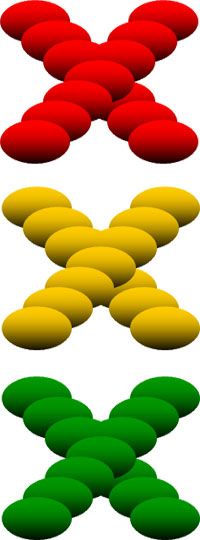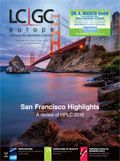International Symposium on the Separation and Characterization of Natural and Synthetic Macromolecules (SCM-8)
The 8th International Symposium on the Separation and Characterization of Natural and Synthetic Macromolecules (SCM-8) will be held from 1– 3 February 2017, in Amsterdam, The Netherlands.

The 8th International Symposium on the Separation and Characterization of Natural and Synthetic Macromolecules (SCM-8) will be held from 1– 3 February 2017, in Amsterdam, The Netherlands. SCM-8 is a leading meeting on the characterization of high-molecular-weight analytes covering topics from a wide range of specialties, including analytical chemistry, materials and polymers, and the life sciences. The conference offers a platform for scientists from diverging backgrounds with different perspectives to interact, discuss subjects of mutual interest, and discover new synergies. The latest developments in theory, methodology, technology, and instrumentation will be presented along with a strong focus on solving relevant practical industrial problems.
The SCM-8 programme puts important topics and methods at the foreground with a particular focus on polymer characterization, non-soluble materials characterization, analysis of soluble polymers, and the separation of veryâhighâmolecular-weight polymers and small particles.
However, difficult problems cannot usually be addressed by a single technique and may even require several novel approaches. Exciting developments in mass spectrometry to characterize macromolecules are set to be discussed, including new instruments and applications. Developments in spectroscopic techniques, microscopy, and thermal analysis will be discussed and special detectors for macromolecules, such as light scattering and viscometry, will also be on the agenda.
The M•E•A•T (Make, Encounter, Apply, Technology) categories of the SCM-8 conference consists of a number of important aspects:
- The organizer’s strong connection with the polymer-manufacturing industry, those who MAKE macromolecules, has contributed greatly to the success of previous meetings.
- The conference also caters for those who ENCOUNTER natural macromolecules, such as polysaccharides. The nature, composition, and properties of these macromolecules is a key focus of the meeting.
- SCM-8 is a vital meeting for all the industries and scientific fields where macromolecules are APPLIED. This includes, among other fields, the food industry, the pharmaceutical industry, and the medical and biological science sectors.
- Finally, SCM-8 is a key platform for industries that produce TECHNOLOGY for separating and characterizing natural and synthetic macromolecules.
As well as the diverse background of the speakers from industry and academia, there are many opportunities for young scientists to present their work and interact with the top people in their field. The programme of SCM-8 will feature: a limited number of plenary lectures by internationally renowned speakers, addressing subjects of broad interest. Keynote lectures will be presented by leading experts and there are many slots in the programme for submitted oral presentations. SCM-8 also features tutorial lectures intended to bring non-specialists up to date on important topics. State-of-the-art overview lectures will provide detailed perspectives on hot topics in the field. Technology providers are invited to share their latest innovations and applications in technical seminars and two one-day short courses on specific topics are being organized and will be announced before the conference. Several awards will be presented during SCM-8, including the SCM Award for an upcoming scientist and the second SCM Lifetime Achievement Award. Finally, SCM-8 will feature a variety of posters presenting specific studies enabling discussion on all aspects of the work with fellow experts.
The best instrumentation available for analysis and characterization will be on display at the instrument exhibition and ample catering will be provided in the exhibition hall to stimulate scientific and social interactions. Of course, there will be another legendary SCM conference party!
Abstracts for oral presentation during SCM-8 are welcome until 1 October 2016. Abstracts for scheduled poster presentations are invited until 15 December 2016. We will accommodate last-minute posters after that date, but we cannot promise that these will appear in the final printed programme.
For further information see: www.scm-8.nl or e-mail: info@scm-8.nl

New Study Reviews Chromatography Methods for Flavonoid Analysis
April 21st 2025Flavonoids are widely used metabolites that carry out various functions in different industries, such as food and cosmetics. Detecting, separating, and quantifying them in fruit species can be a complicated process.
Quantifying Terpenes in Hydrodistilled Cannabis sativa Essential Oil with GC-MS
April 21st 2025A recent study conducted at the University of Georgia, (Athens, Georgia) presented a validated method for quantifying 18 terpenes in Cannabis sativa essential oil, extracted via hydrodistillation. The method, utilizing gas chromatography–mass spectrometry (GC–MS) with selected ion monitoring (SIM), includes using internal standards (n-tridecane and octadecane) for accurate analysis, with key validation parameters—such as specificity, accuracy, precision, and detection limits—thoroughly assessed. LCGC International spoke to Noelle Joy of the University of Georgia, corresponding author of this paper discussing the method, about its creation and benefits it offers the analytical community.










